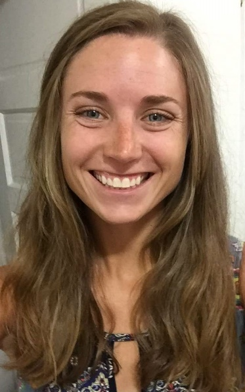
Name: Jessica Salley, MS, CCC-SLP
Earned Degree(s): B.S. in Communication Sciences and Disorders, M.S. in Speech-Language Pathology
Program of study/Year in program: Ph.D. in Communication Sciences, 2nd Year
Mentor/Advisor: Dr. Angela Ciccia, PhD, CCC-SLP
University: Case Western Reserve University, Cleveland, OH
ANCDS Fellowship Mentor: Heather Coles, MA, CCC-SLP
Area(s) of research, teaching and/or clinical interest: pediatric brain injury and cognitive communication disorders
1. Why were you interested in the ANCDS conference fellow program?
For a few years, many friends, colleagues, and mentors had highly recommended the ANCDS conference to me. I often heard about the welcoming nature of the ANCDS community, the engaging and ground-breaking nature of the conference, and the intimate environment the conference provided for like-minded clinicians and researchers. As a student, it can be difficult (and intimidating) to insert yourself into a group of professionals, but the fellow program offered a great opportunity to engage with a professional established in ANCDS and receive mentorship on not only the conference, but the neurologic communication sciences field at large.
2. What did you enjoy about the ANCDS conference fellow program?
I enjoyed interacting with and learning from my mentor and fellow mentors and mentees. The mentors were very willing to guide me, answer my questions, and share in my excitement over the content of the conferences. It was exciting to meet and learn from both established researchers and clinicians in the field and fellow mentees, the future of the field. Rarely are we able to interact with a group of scientists invested in the same area of research and practice. The ANCDS conference and the fellow program offered just that.
3. Why would you recommend the ANCDS conference fellow program to future students?
The fellow program is a great entry point to become further engaged with ANCDS and its members. By networking and fostering relationships at the conference, you can establish relationships that will be continued beyond the conference. Not only did I gain a mentor from the fellow program, I also created foundations for future collaborative research partnerships and professional relationships with my soon-to-be colleagues.
4. Based on this first introduction to ANCDS, what are the benefits to students, clinicians, and/or researchers?
I think the greatest benefit of ANCDS is the network of colleagues it connects you with. Unfortunately, neurogenic communication disorders can be lost in the shuffle of bigger associations and events—there aren’t many of us! ANCDS provides a place, whether in person, at their conference, or online in their webinars and resources, for those invested neurogenic communication disorders to learn and further the profession together.
5. Describe your current or recent research project.
I am currently conducting a pilot study for my dissertation. I am investigating the impact of cognitive fatigue on academic performance for children with brain injury. The study utilizes parent and child report of fatigue paired eye gaze metrics, like pupil size, to measure fatigue within and across academic-like tasks. Hopefully, the results can inform better services and support for children with brain injury in the academic setting.
6. Why were you interested in the above project?
Since my undergraduate, I have always been interested in childhood brain injury. This population, and my research, combines my two favorite things about speech pathology: kids and cognitive communication. In considering a dissertation topic, I wanted to establish a question that would be clinically impactful. Cognitive fatigue post-brain injury is understudied but known to have detrimental effects on daily functioning and quality of life. At my university, I have the opportunity to use eye gaze technology. Through the use of eye gaze biometrics and parent/child reports, I feel I can fill a gap in the field that ultimately would improve the educational experiences and lives of children with brain injury.
